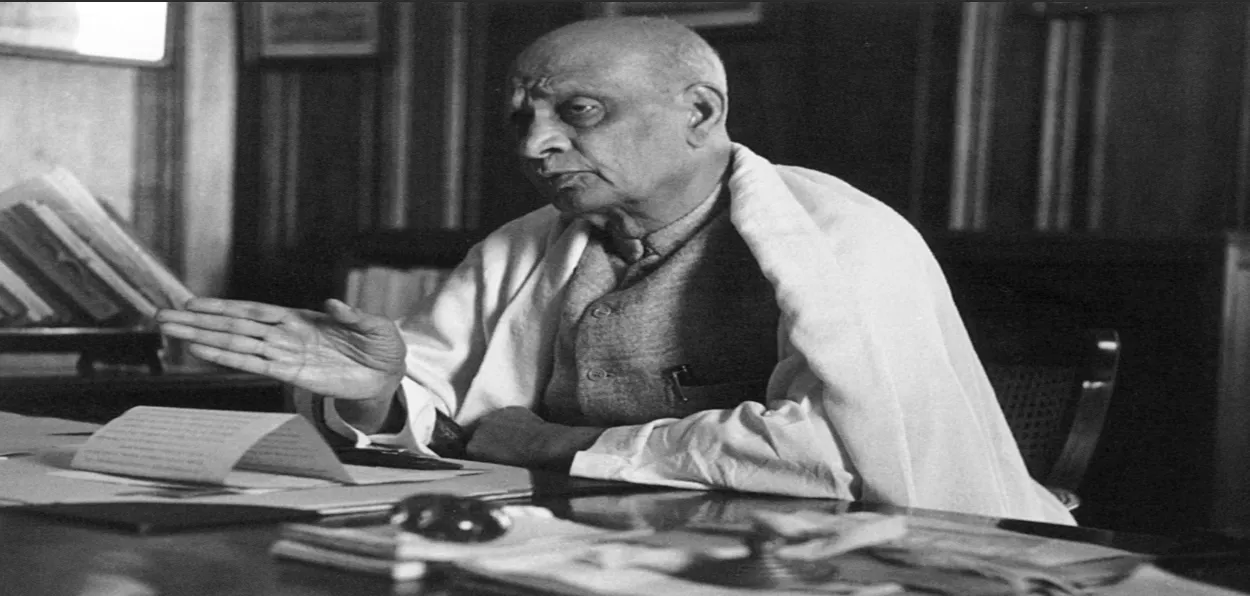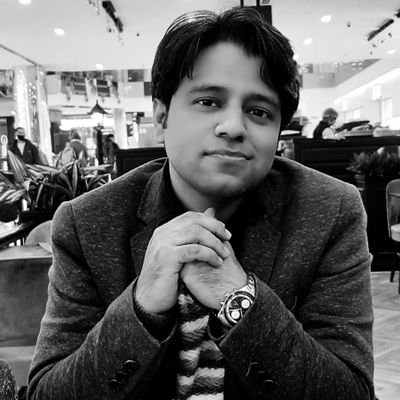
 Saquib Salim
Saquib Salim
There are a few persons in Indian history who have as contested a legacy as Sardar Vallabhbhai Patel’s. Many Muslims and left-leaning analysts believe that Patel was pro-Hindu, if not anti-Muslim. Interestingly, many in the Sangh Parivar eulogise him for the same belief.
However, some scholars have taken a balanced look and analysed him as a practical man who had to accomplish an unprecedented task of leading a country at a time when religious passions were at their peak after the country was being divided in the name of religion.
Was Patel a communal person who favoured Hindus over Muslims or other religious minorities? Before analysing facts to find the answer to this question, let’s take into account the fact that Patel was one of the most trusted followers of Mahatma Gandhi, a champion of Hindu-Muslim unity.
When he was told that there were allegations against him of favouring Hindus over Muslims, he told an audience in Jaipur on 17 December 1948, “I always desire peace. If l did not, I could not have spent a lifetime with Gandhiji. Whether it displeases Hindus, Muslims, or anybody else, I do not hesitate to say what I feel. I admit that I do so in blunt language, but to learn the proper language, I would have to spend my next birth also with Gandhiji.”
This might look like a defence against the allegations, but how can we verify the truth? First, we must see if Sardar sided with the communal forces within the Congress. Before the partition, when the Muslim League was demanding Pakistan and communal feelings had engulfed almost everyone, a Hindu member of the All-India Congress Committee (AICC) said that all Muslims should leave Congress and join the Muslim League.
On this, Sardar told him that he himself should leave Congress and join the Muslim League because his mentality suited them more.
.png) Sardar Patel with Maulana Abul Kalam Azad
Sardar Patel with Maulana Abul Kalam Azad
In 1946, when the Constituent Assembly was being elected, several Hindu politicians raised a point that the NWFP had no non-Muslim seat and hence no Hindu could be elected from that province. Tatel sided with this arrangement.
In a letter to Gopichand Bhargava (dated 26 May 1946), he wrote, “It is true that in the Frontier, non-Muslims get no seat and no right of electing a member to the Constituent Assembly, but the Muslims in Orissa have also been similarly treated as the principle of population basis has been accepted uniformly. Therefore, one cannot say that there has been injustice in this matter.”
Another charge against Sardar is that he warned Muslims to remain loyal to the country, otherwise face the consequences. Many people say that he was singling out Muslims as suspects against the nation. For this, we have to see if this ‘blunt language’ was reserved for Muslims or was the norm for him.
On 6 May 1948, Sardar wrote to Jan Sangha leader Syama Prasad Mookerjee, “.... militant communalism which was preached until only a few months ago, by many spokesmen of the (Hindu) Mahasabha, including men like Mahant Digvijaya Nath, Prof. Ramsingh and Deshpande—could it not be regarded as a danger to public security? ‘The same would apply to the R.S.S.”
On 17 March 1949, Sardar Patel told the Parliament that India was facing two internal threats, viz., communists and communal. He said, “The communal threat has come principally from the RSS and the Akali Dal.
Insofar as the R.S.S. might seek to bring about a regeneration of the Hindu community by peaceful and legitimate means, there can be and need be no quarrel with its activities. It is only when it seeks to achieve this object by spreading poison and hatred against other communities who are entitled under the law to equal protection from the established Government, and when it seeks to achieve its object by resort to unlawful or violent means, then it pits itself against the forces of law and order. None is more conscious than I of the zeal and energy which lie contained in the youth of this Organisation. I have made more than one appeal to the members of this Organisation to give up their wrong methods and to follow the constitutional means.”
In the same address, Sardar said, “Perhaps I may say a word about the Muslims of India. Except for sporadic activities of their old organisations, such as the Muslim League and the Muslim National Guards, which I think they would do well to forget and give up in the light of present conditions, they have on the whole kept the peace of the country and have settled down, somewhat disillusioned but more or less willingly to their new loyalties. I can assure them that, so long as they behave as loyal citizens of this country, they shall have every protection to their life, property and religion which this Government can extend to them. No better proof of this could have been given than by the steps we took to guarantee their safety in the City of Delhi itself.
"We willingly agreed to keep their houses vacant against the return of those who had fled to Pakistan, although a large number of homeless refugees were at our hands. The work of restoration of mosques, which has been virtually completed, and the one-way traffic of return of refugees from Pakistan, are sufficient testimony to the peace and amicable relations that prevail in this country. High posts, both in the Army and Civil Service as well as in public life, continue to be shared by them. Thus, the cause for which Gandhiji fasted and for which he had to lay down his life has been fulfilled. In return for all this, the State does not expect from the Muslims anything more than what it demands from other communities, namely, a complete and unquestioned loyalty to their State.”
Does this sound like Sardar was specifically ‘blunt’ for Muslims?
In the same speech, Sardar said of communists, “We are wedded to constitutional progress and peaceful means. It is open to the Communists to use those means to change the social order or to change the Government, but if they resort to other methods or means—violent, treacherous and mischievous- then Government must take up that challenge and suppress them with all the forces at their command.”
Some writers point out that when Sardar went to Hyderabad after Operation Polo, he warned the Muslims about their conduct. They miss the point that in the same breath, he warned Hindus of India as well. In Hyderabad, while addressing thousands, Sardar said, “..... when I hear that some Muslims celebrated the occasion (slipping away of Laik Ali from India), danced with joy and feasted, I naturally began to entertain doubts whether Muslims here feel that their future lies in India. I do not say that they are the only ones to blame.
"I know that, when Gandhiji was assassinated, some Hindus celebrated the occasion in a similar way. I only wish to emphasise that until this devilry goes out of the two communities, there would be no real peace. I do wish to say to Muslims that they are equals, that they have equal rights as Indian citizens and that they are entitled to live in peace and in complete protection of the law and Government. At the same time, every Indian citizen, whether he is a Hindu or a Muslim, will have to behave as an Indian and act as an Indian, and the sooner they realise this, the better.”
Sardar again and again reiterated that he differentiated between the Muslim League and normal Indian Muslims. In his view, common Muslims had suffered because of the Muslim League, and now Indian Muslims were under immense pressure to prove their loyalty.
One of the major reasons behind this portrayal of Sardar as a communal man was the reporting of Pakistani newspapers just after independence. In March 1950, when Sardar went to Kolkata (then Calcutta) to analyse the situation because of the fresh refugee influx from East Pakistan, the Dawn reported, “Bombs should not fall on your own policemen. They are the guardians of the freedom you have achieved with the blood of your men, women and children in Noakhali. Do not forget Noakhali. Do not forget that important limbs of your Mother India have been cut! Do not forget that your goal is not yet achieved, and do not forget that you and your Police have to fight with someone else.”
This was not what Sardar had said in Kolkata. He talked about the police in connection with communists. He said, “We have got used to calling the Police bad names in the past. We have to change that mentality. The Police, which we maligned, was different from the Police which is serving you today. They are volunteers; they are bearing the burden of a great responsibility. You should have respect and sympathy for these guardians of law and order. If you do not, you will regret it.”
Patel, in Kolkata, told an audience, “Anger or hate will not avail you. Our brothers, both Hindus and Muslims, have been separated from us. All of us do wish that people on both sides of the frontier should prosper. But for that, both sides must be patient, brave and prudent.”
ALSO READ: When Patel asked Nehru if he wanted to keep Kashmir or give it away
Sardar Patel was a practical man who had the responsibility to see the law and order situation of India. He did not sugarcoat his words, but he was equally ruthless to everyone. He took Muslims to the task but never spared Hindus, Sikhs, or communists. Rather, if we look closely, he dealt with communists and R.S.S. more forcefully than Muslims, especially after the assassination of Mahatma Gandhi.
